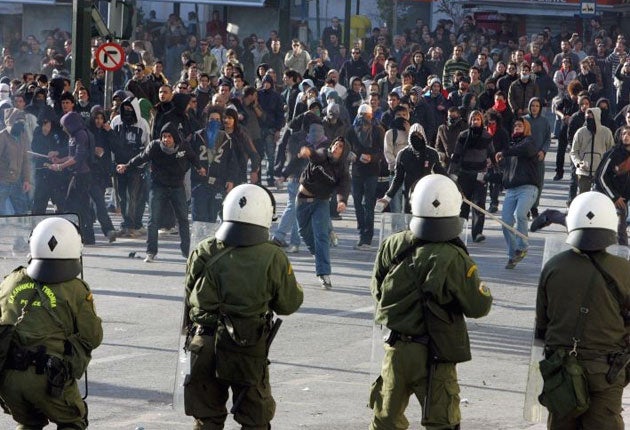'We won't show leniency', Greek PM warns rioters
Unions reject government appeal to call off a general strike planned for today

The streets of Athens resembled a battleground last night after the funeral of a teenager shot dead by police triggered a fourth consecutive day of rioting and violent clashes.
Amid the worst civil unrest since the fall of the military junta in 1974, pressure grew on the government of Costas Karamanlis: trade unions rejected the Prime Minister's appeal to call off a general strike planned for today and the main opposition demanded the government's resignation. Mr Karamanlis began emergency meetings with the Greek President, Karolos Papoulias, and party political leaders to explore ways to lower the temperature as he struggled to contain the crisis.
The funeral of 15-year-old Alexandros Grigoropoulos whose death prompted the initial rioting last Saturday, was held in a southern Athens suburb, attended by 6,000 mourners. The ceremony was peaceful but there were scuffles outside the cemetery after youths leaving threw stones at police.
In the afternoon, thousands of mourners gathered in the streets outside the cemetery, many of them holding white roses. "We are here because we want to express our disappointment with this government that fails to protect Greece's youth," said 17-year-old Marina Zafiropoulou who was with a school delegation.
Clearly, the crisis is being sustained by wider unrest rather than just as a reaction to the death of the teenager at police hands. Before the funeral, there were clashes with police outside parliament. Schools were shut as hundreds of teachers, university lecturers and students rallied in central Athens. Some had banners which read: "Assassins, the government is to blame."
"Everyone has let our children down," said Christos Kittas, who resigned as dean of Athens University after the rioting spread to campuses. "Every day, I see that students are becoming more hostile toward us and towards figures of authority."
In other areas, youths hurled bottles and stones at riot police who responded with tear gas. At one point, a policeman fired warning shots into the air to disperse a crowd around a police station in the southern part of the capital.
Riots were also reported in other towns and cities, including Thessaloniki, Ioannina, Trikala and Patras. Police stations in the port of Pireaus and the island of Corfu were attacked.
Mr Karamanlis who has blamed "extreme elements" and called the protesters "enemies of democracy" struggled to reassert his authority. "We won't show any leniency," he warned. "No one has the right to use this tragic incident as an excuse for acts of violence. At this critical time, the political world must unite to condemn those responsible for this disaster and isolate them."
But it is still unclear what measures the government can realistically deploy in response to the spreading unrest. Police have arrested 200 people for disturbances and looting. The main opposition party leader has accused the government of failing to protect the country. The Socialist leader, George Papandreou, said Greeks had lost trust in the government. Lila Papapashou, 30, who works for the Athens municipality, said: "The city looks like a war-zone. There is violence everywhere. Properties are being destroyed and the government is doing nothing. We can't allow this to continue."
It is a view shared by many here, although the policeman who fired the shots believed to have killed the boy has already been charged with murder. The incident and the ensuing mayhem have fuelled public discontent at the country's stunted economic growth and high unemployment levels.
Mr Karamanlis's party holds a one-seat majority in parliament and was trailing the opposition Pasok, Socialist party by more than five percentage points in polls before the riots for the first time in years.
The country has experienced a rising wave of anti-government strikes and protest marches as dissatisfaction has been rising. The handling of this crisis could largely determine the rise or fall of the government's popularity in public opinion. Many analysts are already forecasting that the Greek leader may have no choice but to call an early election next year.
Subscribe to Independent Premium to bookmark this article
Want to bookmark your favourite articles and stories to read or reference later? Start your Independent Premium subscription today.

Join our commenting forum
Join thought-provoking conversations, follow other Independent readers and see their replies